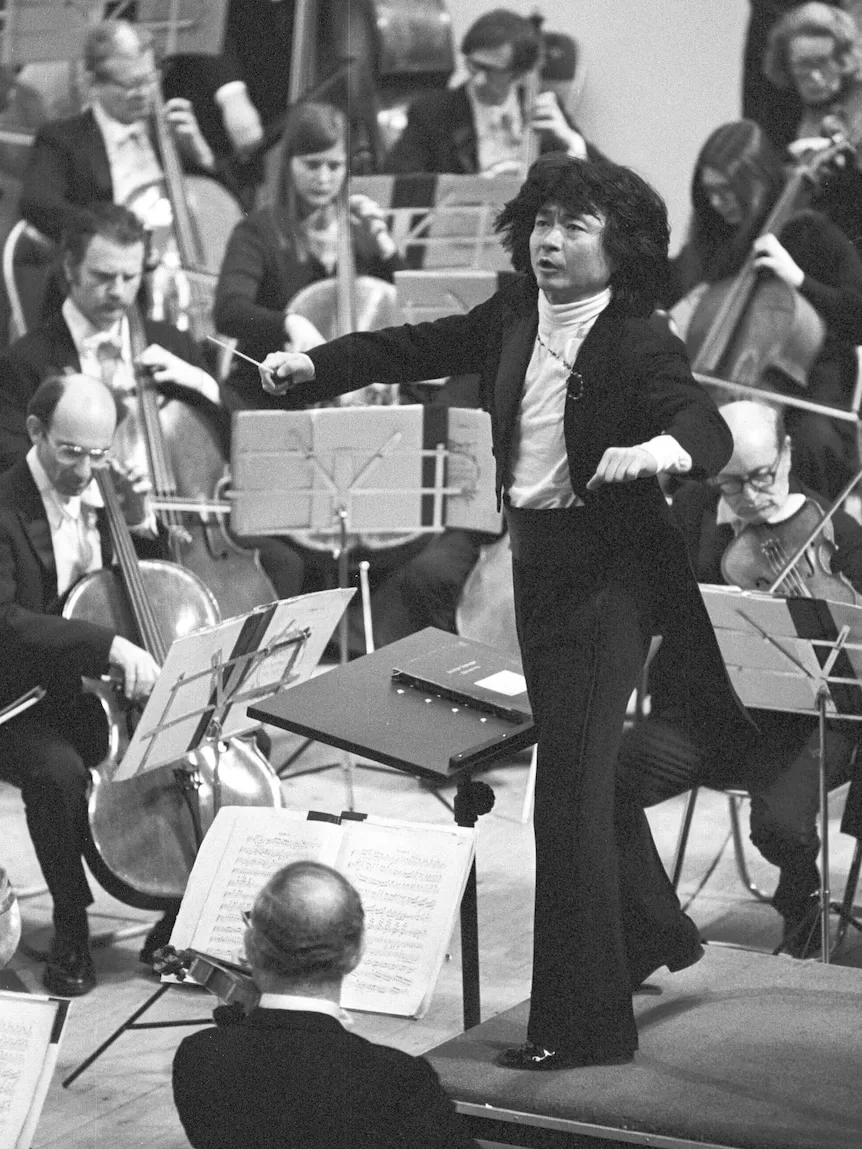- In short: Japanese conductor Seiji Ozawa has died of heart failure at the age of 88 at his home in Tokyo.
- He led the Boston Symphony Orchestra He led the orchestra from 1973 to 2002, longer than any other conductor in the orchestra’s 128-year history.
- In 2022, he conducted at his Seiji Ozawa Matsumoto Festival in Japan to mark its 30th anniversary, which was his last public performance.
World-renowned Japanese orchestra conductor Seiji Ozawa has died of heart failure at the age of 88, his management office has said.
Ozawa died on Tuesday at his Tokyo home and his funeral was attended only by close relatives as his family wished to have a quiet farewell, his office, Veroza Japan, said.
The acclaimed Japanese maestro, one of the best-known of his generation, spent decades in the rarefied atmosphere of top orchestras around the world but wore baseball-themed ties to interviews and preferred to be called by his first name, not “maestro”.
His bushy hair and smile charmed audiences, especially in the United States, where his tenure as music director of the Boston Symphony Orchestra spanned nearly three decades.
He led the orchestra from 1973 to 2002, longer than any other conductor in the orchestra’s 128-year history, exerting enormous influence in that time.
He appointed 74 of its 104 musicians and his celebrity attracted famous performers including Yo-Yo Ma and Itzhak Perlman.
He also helped the symphony become the biggest-budget orchestra in the world, with an endowment that grew from less than $US10 million ($15 million) in the early 1970s to more than $US200 million in 2002.
When Ozawa conducted the Boston orchestra in 2006 — four years after he had left — he received a hero’s welcome with a nearly six-minute ovation.
In 2020, Boston proclaimed his birthday, September 1, Seiji Ozawa Day, prompting a pleased Ozawa to remark that Boston was his second home.
“That was a really important time in my life,” he was quoted as saying.
“No matter where I go, Boston is a part of my heart.”
Years later, back in Tokyo, the unpretentious Ozawa was sometimes spotted on subway platforms dressed in a jacket and cap of his beloved Boston Red Sox baseball team and would stop to chat to admirers.
“I’m the complete opposite of a genius, I have always had to make an effort,” he told a 2014 news conference.
“I don’t really like studying, but I had to do it if I wanted to make music. Anybody with genius can easily do better than me.”
From 2002 to 2010, he was music director of the Vienna State Opera, but his stint was overshadowed by ill health, including a diagnosis of oesophageal cancer the year he left.
He later had surgery for a back injury and suffered bouts of pneumonia, which often kept him sidelined but failed to dent his enthusiasm.
“I will continue doing everything I have always done, teaching and conducting orchestra, until I die,” Ozawa told Reuters in a December 2013 interview, at which he wore a Boston Red Sox baseball tie and black jacket.
He remained active in his later years, particularly in Japan. He was the artistic director and founder of the Seiji Ozawa Matsumoto Festival, a music and opera festival in Japan.
He and the Saito Kinen Orchestra, which he co-founded in 1984, won the Grammy for best opera recording in 2016 for Ravel’s L’Enfant et Les Sortileges (The Child and the Spells).
In 2022, he conducted his Seiji Ozawa Matsumoto Festival for the first time in three years to mark its 30th anniversary. That turned out to be his last public performance.
Looking ahead
The down time had advantages by freeing him to study music, talk with friends, such as best-selling Japanese author Haruki Murakami, and to think, Ozawa said.
“I had always been looking ahead, since if you don’t forget the piece you conducted at one day’s concert you can’t prepare for the next,” he wrote in a 2014 essay for the Nikkei newspaper.
“I had never reflected on the past. There had simply never been enough time.”
The third in a family of four boys, Ozawa was born in Shenyang, China, in 1935 where his father, a dentist, had settled. They later moved to Beijing.
His mother, a Christian, took him to church to sing hymns, and the family sang at home, sometimes accompanied by one of his brothers on an accordion.
“That was how I met music,” he later wrote.
The family returned to Japan in 1941, taking only some clothes, an album of pictures and the accordion, and Ozawa began learning piano. When he sprained his finger playing rugby and could not continue, he switched to conducting.
In 1959, Ozawa set out for Europe on a cargo ship, taking two months to reach France, where he was determined to test his skills at a young conductors’ competition in Besancon.
He won, opening doors around the world and allowing him to work with greats such as Herbert von Karajan and Leonard Bernstein.
Stints in Toronto, San Francisco and Singapore followed. In 1973 he became director of the Boston Symphony Orchestra, starting a 29-year relationship.
A rabid sports fan, Ozawa’s heart was in Boston with the Red Sox, the New England Patriots football team and basketball’s Celtics.
Though Ozawa devoted time to teaching — in Boston, he held weekly classes for children, who all called him Seiji — his passion was for nurturing classical music in Japan, where he set up a summer music festival in the city of Matsumoto named for Hideo Saito, his first mentor.
The festival became such a success that music fans flocked to the city in the mountains and even taxi drivers became well-versed in classical music.
Ozawa has two children. His daughter, Seira, is an author and his son, Yukiyoshi, an actor.
Reuters/AP
